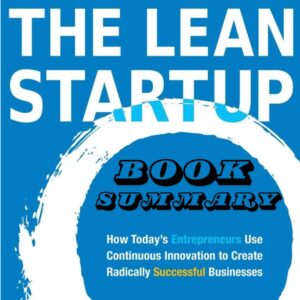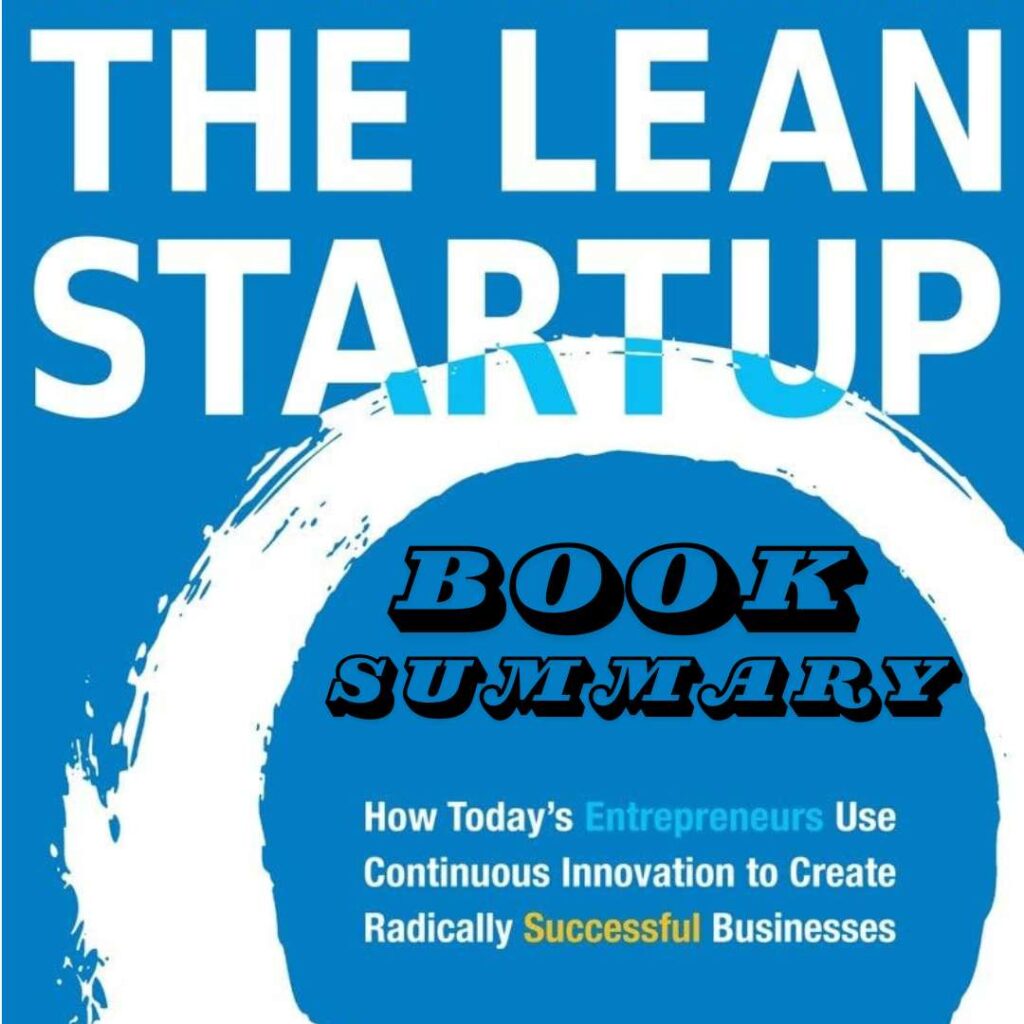The lean startup summary
The Lean Startup is a groundbreaking business methodology developed by Eric Ries with a highly solution-oriented approach for startups which focuses on short, iterative product development cycles. It’s an innovative approach to bringing products to market that has revolutionized the business world and captured the attention of companies around the globe.

Table of Contents
History of The Lean Startup
Eric Ries first coined the term Lean Startup in 2008. Drawing inspiration from lean manufacturing, a production philosophy that values efficiency and productivity, Ries distilled these principles into a streamlined approach for startups.
Key Principles of The Lean Startup
The heart of this methodology lies in a few key principles:
- Value Hypothesis: Identifying whether a product will create value in the market once it’s finished.
- Growth Hypothesis: Speculating how new customers will discover a product or service.
- Innovation Accounting: A way of evaluating progress when all the metrics typically used in an established company are effectively zero.
Importance of The Lean Startup in the Modern Entrepreneurial World
The lean startup methodology has gained worldwide recognition due to its revolutionary approach of making startups less risky. It focuses on understanding what customers want early in the development process which helps in building products that people actually want.
Summary of The Lean Startup: Core Concepts and Values
The Lean Startup methodology is built upon several fundamental concepts and core values.
Value Hypothesis in The Lean Startup
The value hypothesis is the belief that there is a customer who needs your product. This is tested through a series of MVPs (minimum viable products).
Growth Hypothesis in The Lean Startup
The growth hypothesis tests how new customers will find your product. Effective growth strategy is the cornerstone of every successful business.
The Idea of The Minimum Viable Product (MVP)
The MVP is the most stripped-down version of a product that can be released to test the Value and Growth Hypotheses. The purpose of an MVP is to learn about your customers’ interests and needs with minimal effort.
The Validated Learning Process
This process involves experimenting, collecting data, and quickly iterating or pivoting based on these lessons. This allows startups to adapt quickly to changes and improve their product based on customers’ feedback.
The Lean Startup: The Build-Measure-Learn Feedback Loop Rundown
Understanding the Build-Measure-Learn Methodology
This cycle is at the core of the Lean Startup methodology. It involves turning ideas into products, measuring customers’ reactions and behaviors against built products, and then deciding whether to pivot (course correct) or persevere.
Importance of Building MVPs
Building MVPs are critical in avoiding the development of products that customers ultimately do not want. It enables a business to test the demand for the product without fully developing it.
The Role of Actionable Metrics and Innovation Accounting
To improve products through the Build-Measure-Learn feedback loop, startups must be able to measure product changes and impacts. This requires actionable metrics, not vanity metrics. Innovation accounting focuses on these kinds of metrics, making it easier to hold startups accountable.
Feedback Assimilation and Pivot or Persevere Dilemma
A startup should quickly incorporate all the lessons learned from the feedback loop into its development process. This might involve a pivot – a change in strategy that keeps one foot rooted in what has been learned so far, while the other foot makes a fundamental change.
The Lean Startup in Practice: Successful Case Studies
Case Study 1: Dropbox – How the Lean Startup Principle Applied
Dropbox is a prime example of a company that used the lean startup principles to its advantage. They started with a simple demonstration video as an MVP to gain user interest before developing into a billion-dollar company.
Case Study 2: Airbnb – The Lean Startup Methodology Implications
The creators of Airbnb applied the Lean Startup’s principles by iterating their product many times, using the feedback they received from their customers, which led to the platform’s massive success we see today.
Criticisms and Limitations of The Lean Startup Model
Common Criticisms of The Lean Startup
While The Lean Startup methodology offers many advantages, it’s not immune from criticism. Some argue it favors quantity over quality, with too much emphasis on short-term learning cycles.
Understanding the Limitations and Areas of Improvement
The Lean Startup approach isn’t suitable for every company or industry. For businesses with a high barrier to entry or those developing complex or highly regulated products, testing MVPs over iterative cycles can be more challenging and less impactful.
The Lean Startup methodology is not just about how to create disruptive innovations but also about implementing a management structure that can adapt and adjust accordingly. Let’s find out how relevant and adaptable the Lean Startup principles are in today’s business environment:
Is the Lean Startup Relevant Today?
In the dynamic business landscape of today, survival is not about size but agility. The Lean Startup principles underscore this reality by promoting flexibility and iterative learning. Its inherent elasticity enables businesses to bend with market fluctuations.
- Alleviating Risk: Uncertainty and risk are two constants in any business. The Lean Startup’s cornerstone– Build-Measure-Learn feedback loop– seeks to alleviate these risks with its iterative nature, thus making it a valuable tool for companies navigating our volatile market.
- Promoting Innovation: Eric Ries also emphasizes that innovation can be schematized into a discipline and managed. This way, businesses can continually innovate and stay ahead of their competition.
How to Apply The Lean Startup Methodology in Your Business
Adopting the Lean Startup model involves cultivating a mindset that embraces Lean principles, like Validated Learning and the MVP concept. Some actionable steps include:
- Applying MVP Concepts: Before developing a full-fledged product, validate your Value Hypothesis by putting out a Minimum Viable Product (MVP). Take customer feedback seriously and iterate based on the response.
- Embracing the Feedback Loop: Implement the Build-Measure-Learn feedback loop. Base decisions on actionable metrics rather than vanity metrics. This will help in building sustainable products.
The Lean Startup vs. Traditional Business Models
It is imperative to compare The Lean Startup with traditional business models to truly understand its value proposition.
Comparing Between the Models
- Traditional business models often involve detailed planning and heavy upfront investment, whereas the Lean Startup approach promotes beginning with a simple model that can evolve over time based on customer feedback.
- While traditional models may rely on prediction and planning, a Lean Startup relies instead on experimental data and pivot or persevere dilemma, fostering innovation and agility.
Pro’s and Con’s of Each Approach
- Benefits of Lean Startup: increased flexibility, constant iteration, and shortened development cycles.
- Drawbacks of Lean Startup: discipline required for constant iteration, intensive user involvement.
Lessons from The Lean Startup for Modern Entrepreneurs
The Lean Startup methodology offers long-term implications for modern entrepreneurs that encourage the setup of sustainable businesses.
Valuable Entrepreneurial Lessons
- Prioritize Learning: Focus on learning rather than growth in the initial stages. Emphasize Validated Learning and customer validation to create products that the market genuinely needs.
- Flexibility over Perfection: Rather than striving for a perfect product, aim for a good-enough product that can be improved based on customer feedback.
The Future of The Lean Startup: A Perspective
The future of the Lean Startup model promises to continue changing the business world as more businesses recognize its relevance and applicability.
Projected Continuation
The Lean Startup approach, with its risk-mitigation strategy and focus on agile development, likely will continue to be a popular choice for startups and established companies alike.
Potential Evolution
Over time, The Lean Startup may need to evolve to incorporate more collective and cooperative tactics, without diluting its main principles of flexibility and validated learning.
FAQs: The Lean Startup
What is the Lean Startup methodology all about?
The Lean Startup methodology is a business approach that emphasizes creating and managing successful startups by relying on validated learning, scientific experimentation, and iterative product releases to shorten product development cycles.
What are the key principles of the Lean Startup?
The key principles of the Lean Startup include building a Minimum Viable Product (MVP), testing assumptions through rapid experimentation, measuring progress using actionable metrics, and adjusting strategies based on validated learning.
How does the Build-Measure-Learn feedback loop work in the Lean Startup methodology?
The Build-Measure-Learn feedback loop in the Lean Startup involves continuously developing products, measuring their performance, learning from data-driven insights, and making informed decisions to pivot or persevere based on customer feedback and market validation.
Can you provide examples of successful companies that applied the Lean Startup principles?
Companies like Dropbox and Airbnb are prime examples of successful businesses that utilized the Lean Startup methodology to validate their ideas, build scalable products, and achieve market-fit through continuous experimentation and feedback loops.
What are some common criticisms and limitations of the Lean Startup model?
While the Lean Startup methodology has been widely praised for its agile and customer-centric approach, critics point out limitations such as potential oversimplification of market dynamics, challenges in applying the methodology to certain industries, and the risk of tunnel vision on short-term metrics.
How can modern entrepreneurs adapt the Lean Startup principles in today’s competitive business environment?
Modern entrepreneurs can adapt the Lean Startup principles by embracing a culture of experimentation, focusing on customer feedback, leveraging data-driven decision-making, and fostering a mindset of continuous innovation to stay nimble and competitive in the market.
What lessons can entrepreneurs learn from the Lean Startup model for long-term success?
Entrepreneurs can learn valuable lessons from the Lean Startup model, such as the importance of staying close to customers, maintaining flexibility in business strategies, prioritizing validated learning over assumptions, and fostering a culture of innovation and adaptability.
Conclusion: The Essence and Impact of The Lean Startup
Summing up, the essence of the Lean Startup is about enabling businesses to be both innovative and efficient – a necessity in our current, fast-paced entrepreneurial world. The Lean Startup methodology is set to continue impacting contemporary businesses greatly while it harnesses the principles of agility, flexibility, and customer centrality. Through its continuous application and influence, it might just be possible to believe that the Lean Startup is the business model of the future.
Discover marketing services, interviews & publishing tools at SharingStories.


